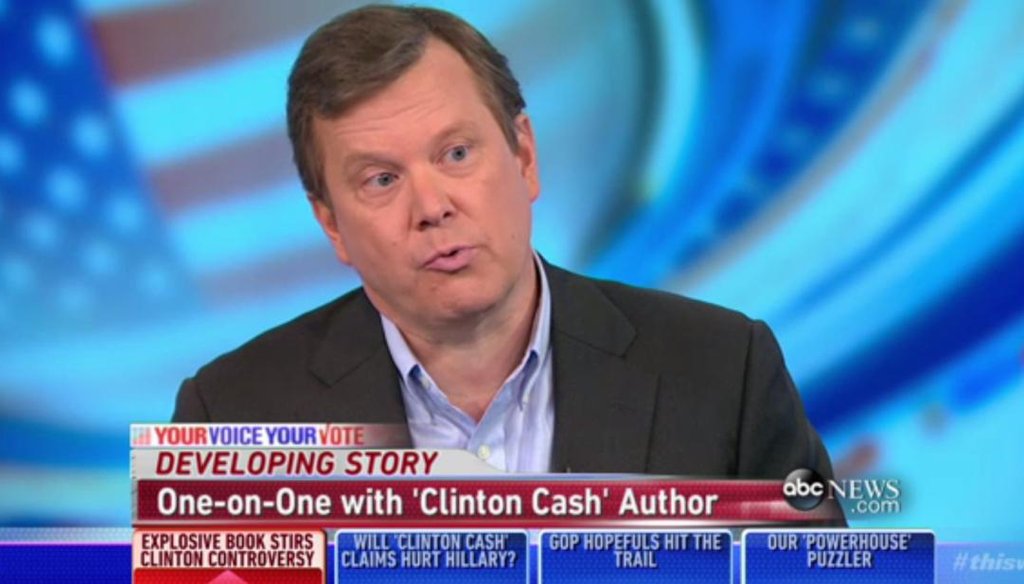Stand up for the facts!
Our only agenda is to publish the truth so you can be an informed participant in democracy.
We need your help.
I would like to contribute

'Clinton Cash' author Peter Schweizer.
Did foreign interests curry favor with Secretary of State Hillary Clinton by paying huge speaking fees to her husband?
That’s the question raised in the forthcoming book Clinton Cash by author and political consultant Peter Schweizer. On the Sunday shows, Schweizer said that while his research uncovered no proof of a quid pro quo between foreign interests and the 2016 Democratic frontrunner, the evidence does suggest a troubling trend.
"When you ever have an issue of the flow of funds to political candidates, whether that's to their campaigns, whether that's to private foundations, whether that's to their spouse, is there evidence of a pattern of — of favorable decisions being made for those individuals?" Schweizer said on ABC’s This Week. "And I think the — the point that we make in the book is that there is a troubling pattern."
Schweizer pointed to a few examples, including the sale of a uranium company backed by Clinton financial supporters to a Russian company. The sale required approval of a U.S. government board that includes representatives from nine agencies, including the Department of State.
Another piece of circumstantial evidence offered by Schweizer: Of the 13 times Bill Clinton received $500,000 or more in speaking fees, 11 came while his wife was secretary of state.
PunditFact can’t fact-check Schweizer’s "troubling pattern," but we did want to look at the specific claim about Bill Clinton’s speaking fees. That rates True.
In 2014, the Washington Post analyzed Clinton’s speaking fees and found the former president made at least $104 million between 2001 through 2012. More than half of that income came from speeches in foreign countries.
To find out more, we turned to Hillary Clinton’s federal financial disclosure forms, made available by the Center for Responsive Politics, a research group that tracks money in politics. Because Hillary Clinton held federal positions from the time they left the White House in 2001 through 2012, financial information for both Clintons is available for all those years.
Income information on the financial disclosure forms supports Schweizer’s claim. We indeed found 13 speeches between 2001 and 2012 in which Bill Clinton was paid $500,000 or more. All but two occurred after January 2009, when Hillary Clinton became secretary of state. You can see the full list at PunditFact.com.
Newt Gingrich went even further than Schweizer on Sunday, saying foreign donations accepted by the Clinton Foundation were "clearly illegal."
"The Constitution says you can't take this stuff," Gingrich said. "We have federal laws that say you can't take this stuff. If this was any person but Hillary Clinton, they'd be under indictment right now for a clearly straightforward problem."
Gingrich is referencing a part of the Constitution known as the Emoluments Clause. But he’s going too far by claiming that the Clinton Foundation donations are "clearly illegal." PunditFact rates that claim Mostly False.
The Emoluments Clause, found in Article 1, Section 9 of the Constitution, reads in part:
"No Title of Nobility shall be granted by the United States: And no Person holding any Office of Profit or Trust under them, shall, without the Consent of the Congress, accept of any present, Emolument, Office, or Title, of any kind whatever, from any King, Prince, or foreign State."
The framers came up with this clause to prevent the government and leaders from granting or receiving titles of nobility and to keep leaders free of external influence.
We asked seven different constitutional law experts on whether the Clinton Foundation foreign donations were "clearly illegal" and a violation of the Emoluments Clause.
We did not reach a consensus with their responses, though a majority thought the layers of separation between the foundation and Hillary Clinton work against Gingrich.
The American system often distinguishes between public officers and private foundations, "even if real life tends to blur some of those distinctions," said American University law professor Steve Vladeck. Vladeck added that the Emoluments Clause has never been enforced.
"I very much doubt that the first case in its history would be because a foreign government made charitable donations to a private foundation controlled by a government employee’s relative," he said. "Gingrich may think that giving money to the Clinton Foundation and giving money to then-Secretary Clinton are the same thing. Unfortunately for him, for purposes of federal regulations, statutes, and the Constitution, they’re formally — and, thus, legally — distinct."
Robert Delahunty, a University of St. Thomas constitutional law professor who worked in the Justice Department’s Office of Legal Counsel from 1989 to 2003, also called Gingrich’s link between Clinton and the foreign governments’ gifts to the Clinton Foundation as "implausible."
"The truth is that we establish corporate bodies like the Clinton Foundation because the law endows these entities with a separate and distinct legal personhood," Delahunty said.
Our Sources
See individual fact-checks.


















































